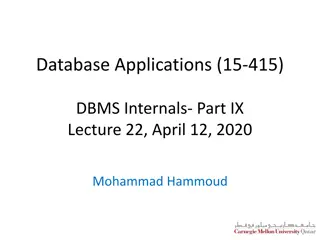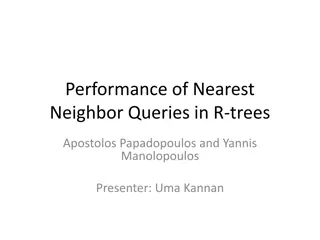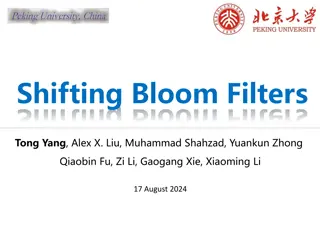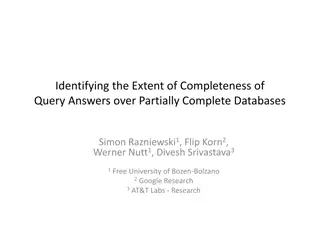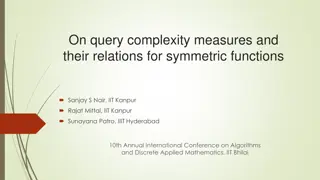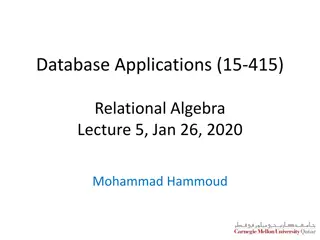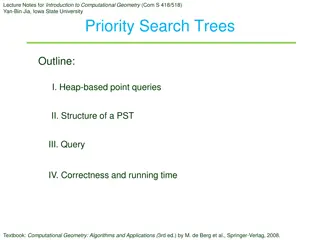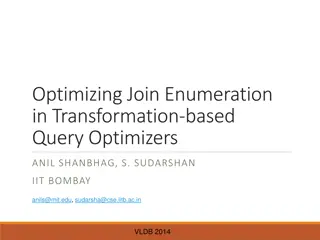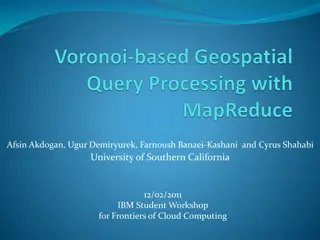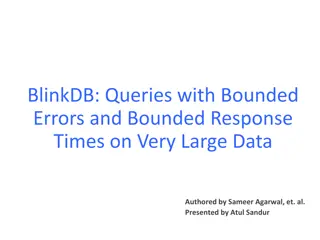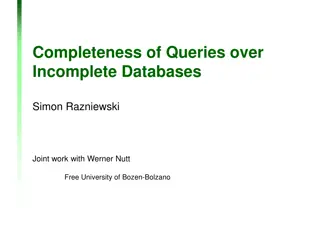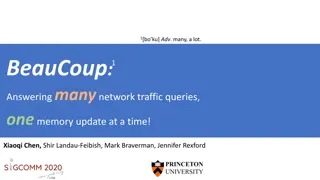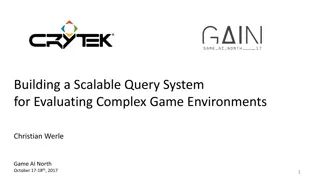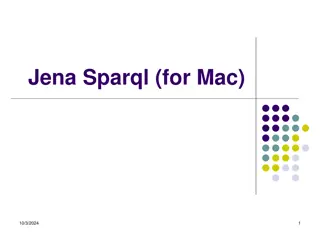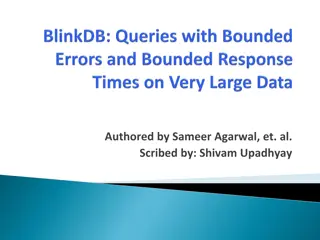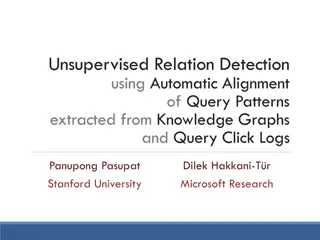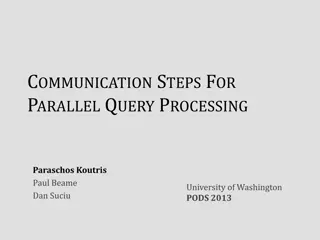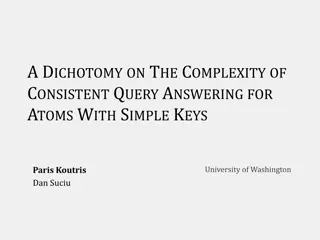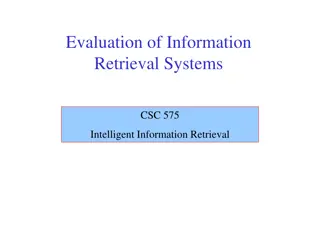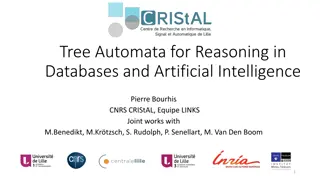Enhancing Query Optimization in Production: A Microsoft Journey
Explore Microsoft's innovative approach to query optimization in production environments, addressing challenges with general-purpose optimization and introducing specialized cloud-based optimizers. Learn about the implementation details, experiments conducted, and the solution proposed. Discover how
2 views • 27 slides
Actions Emanating from the Evaluation of the Governance Reform
The evaluation of the governance reform within the WMO aimed to assess its alignment with strategic objectives, effectiveness in responding to societal needs, coordination efficiency, decision-making process, agility, and more. Evaluation criteria included relevance, design validity, effectiveness,
1 views • 13 slides
Comprehensive School Quality Assurance and Evaluation Process
A detailed insight into the Quality Assurance Department's role in school evaluation and improvement processes, including Whole School Evaluation (WSE), Follow-through initiatives, Teaching and Learning assessments, Resumption and Examination Monitoring. The process involves both internal self-evalu
0 views • 20 slides
Universal Evaluation Framework: Simplifying Evaluation Processes
This session introduces the Universal Evaluation Framework (UEF) developed for evaluating QAA Scotland Enhancement Themes. Participants learn key evaluation questions, evidence capture, and the Theory of Change to enhance evaluation confidence. The QAA Scotland Evaluation Odyssey details historical
2 views • 14 slides
Implementing Blind Evaluation Pilot in HORIZON EUROPE: Key Facts and Process
HORIZON EUROPE is conducting a pilot on Blind Evaluation in the 2023-2024 work program to address biases in the research and innovation evaluation process. The pilot aims to assess the feasibility of blind evaluations in ensuring fairness and mitigating potential biases towards well-known organizati
9 views • 9 slides
Efficient Budget Query Process in Self-Service Banner 9.0
Accessing and navigating the Self-Service Banner 9.0 for budget queries can be simplified by following a step-by-step guide. From initiating a new finance query to selecting relevant columns and submitting the query, this process ensures accuracy and efficiency in tracking budget status by account.
0 views • 19 slides
Query Optimization in Database Management Systems
This content covers the fundamentals of query optimization in Database Management Systems (DBMS), including steps involved, required information for evaluating queries, cost-based query sub-system, and the role of various components like query parser, optimizer, plan generator, and cost estimator. I
0 views • 51 slides
Understanding Active Learning in Machine Learning
Active Learning (AL) is a subset of machine learning where a learning algorithm interacts with a user to label data for desired outputs. It aims to minimize the labeling bottleneck by achieving high accuracy with minimal labeled instances, thus reducing the cost of obtaining labeled data. Techniques
0 views • 17 slides
Performance of Nearest Neighbor Queries in R-trees
Spatial data management research focuses on designing robust spatial data structures, inventing new models, constructing query languages, and optimizing query processing. This study explores the estimation of query performance and selectivity, specifically in R-trees, for efficient access planning.
1 views • 32 slides
Exploring Developmental Evaluation for Better Decision-Making
Delve into the realm of developmental evaluation, focusing on its purpose, principles, and application in practice. Understand how developmental evaluation emphasizes real-time data collection for informed decision-making in complex systems. Learn about key principles such as developmental purpose,
0 views • 25 slides
Enhancing Evaluation Capabilities in Mongolia for Agenda 2030
The Mongolian Evaluation Network in collaboration with UNDP is working to integrate the 2030 Agenda into national strategies and plans, establish institutional coordination mechanisms, align budgets, and enhance data monitoring systems. Key stakeholders including government agencies, NGOs, and inter
0 views • 9 slides
Understanding Evaluation in Education
Evaluation in education is a comprehensive term that encompasses measurement, testing, and qualitative examination of student behavior. It involves both quantitative and qualitative descriptions, along with value judgments. Differentiating from mere measurement, evaluation provides a deeper analysis
0 views • 28 slides
Sustainable Evaluation Systems Workshop Summary
Workshop on Sustainable Evaluation Systems by Stephen Porter at the NEC Conference focused on defining evaluation systems, addressing their failures, and emphasizing the importance of quality, use, and networks in achieving sustainability. Participants engaged in activities such as bingo card introd
0 views • 38 slides
Shifting Bloom Filters at Peking University, China
Explore the innovative research on Shifting Bloom Filters conducted at Peking University, China, featuring evaluations, conclusions, background information, and insights on membership, association, and multiplicity queries. The study delves into hash functions, theoretical results, and the Shifting
1 views • 25 slides
Identifying Completeness of Query Answers in Incomplete Databases
The study delves into how to assess the completeness of query answers when dealing with partially complete databases. By analyzing data from a telecommunication company’s data warehouse, the query results are examined to determine if all warnings generated by maintenance objects with hardware team
0 views • 23 slides
Quantum Query Complexity Measures for Symmetric Functions
Explore the relationships between query complexity measures, including quantum query complexity, adversary bounds, and spectral sensitivity, in the context of symmetric functions. Analysis includes sensitivity graphs, the quantum query model, and approximate counting methods. Results cover spectral
0 views • 19 slides
Understanding Relational Query Languages in Database Applications
In this lecture, Mohammad Hammoud discusses the importance of relational query languages (QLs) in manipulating and retrieving data in databases. He covers the strong formal foundation of QLs, their distinction from programming languages, and their effectiveness for accessing large datasets. The sess
0 views • 39 slides
Impact and Evaluation Toolkit for Churches and Christian Charities
This toolkit aims to equip churches and Christian charities engaged in small-scale social action projects to think about impact, measure impact, choose data tools, reflect on evaluation data, and use it effectively. It covers principles of evaluation, setting objectives, selecting indicators, storyt
0 views • 34 slides
Introduction to Priority Search Trees in Computational Geometry
This lecture outlines the structure and query process of Priority Search Trees (PST) in computational geometry. It covers heap-based point queries, range trees for windowing queries, handling query ranges in 1D and 2D spaces, and using heaps to efficiently handle query ranges. The content discusses
1 views • 18 slides
Overview of Monitoring and Evaluation in the GEF
The Evaluation in the GEF and Training Module focuses on promoting accountability and learning within the Global Environment Facility (GEF) through monitoring and evaluation activities. The GEF Independent Evaluation Office plays a crucial role in assessing results, effectiveness, and performance of
0 views • 25 slides
Optimizing Join Enumeration in Transformation-based Query Optimizers
Query optimization plays a crucial role in improving database performance. This paper discusses techniques for optimizing join enumeration in transformation-based query optimizers, focusing on avoiding cross-products in join orders. It explores efficient algorithms for generating cross-product-free
0 views • 18 slides
Cloud-based Geospatial Query Processing Using MapReduce and Voronoi Diagrams
This research paper presents a cloud-based approach for processing geospatial queries efficiently using MapReduce and Voronoi diagrams. The motivation behind the study, related works in the field, preliminary concepts of MapReduce, Voronoi diagram creation, query types, performance evaluation, and f
0 views • 30 slides
Developing an Evaluation Work Plan for Effective Program Assessment
This presentation by Amy D. Andrade from San Jose State University focuses on developing an Evaluation Work Plan to identify responsibilities and timelines. It covers topics such as Evaluation Coaching Support, Webinar Outlines, Logic Model, Inputs-Outputs-Outcomes, Two Approaches to Evaluation, Pro
0 views • 29 slides
Enhancing Query-Focused Summarization with Contrastive Learning
The study explores incorporating contrastive learning into abstractive summarization systems to improve discernment between salient and non-salient content in summaries, aiming for higher relevance to the query. By designing a contrastive learning framework and utilizing segment scores, the system c
0 views • 16 slides
Practical Tools for Corpus Search Using Regular Expressions and Query Languages
These notes explore practical tools for corpus search including regular expressions and the corpus query language (CQL/CQP). They provide an introduction to using corpora effectively for pattern identification, with examples and explanations. The guide includes information on levels of annotation an
0 views • 47 slides
Evaluation Synthesis in Changing Contexts: Enhancing Knowledge for Development Effectiveness
Evaluation synthesis is crucial for promoting learning, reflection, and decision-making in development work. This process involves bringing together diverse knowledge sources to generate strategic insights and facilitate wider use of evaluation findings. The Independent Office of Evaluation of IFAD
0 views • 20 slides
Overview of BlinkDB: Query Optimization for Very Large Data
BlinkDB is a framework built on Apache Hive, designed to support interactive SQL-like aggregate queries over massive datasets. It creates and maintains samples from data for fast, approximate query answers, supporting various aggregate functions with error bounds. The architecture includes modules f
0 views • 26 slides
Study on Completeness of Queries over Incomplete Databases
Investigation into query completeness over incomplete databases, highlighting the importance of data completeness for accurate query answering. Examples and reasoning provided to illustrate the challenges and considerations in ensuring query completeness.
0 views • 31 slides
Evaluation of FME Zero Emission Neighbourhoods in Smart Cities
The mid-term evaluation process of FME Zero Emission Neighbourhoods in Smart Cities involves self-evaluation, partner evaluation, and panel evaluation. The procedure includes scientific review, evaluation by scholars, and innovation assessment. Key documents like self-reports, progress reports, and
1 views • 20 slides
Overview of Regular Evaluation 2017 Findings in Estonia
In the Regular Evaluation 2017, efforts were made to maximize the benefits of evaluation outcomes for various stakeholders in Estonia such as the state, society, and institutions. The evaluation focused on a range of actions including preparing legislation, finding experts, creating self-report form
0 views • 6 slides
Comprehensive Guide to Training Evaluation Methods
This detailed guide covers the aim of evaluation, evaluation methods, techniques of evaluation, types of evaluation (formative, process, outcome, impact), and the significance of formative and process evaluation in assessing training effectiveness. Learn about the key principles and practices involv
0 views • 45 slides
Efficient Network Traffic Queries Handling Strategies
Solve network traffic queries efficiently by ensuring constant memory updates and minimal memory access. Implement strategies such as managing multiple data structures for various query types and coordinating queries to optimize packet processing. Explore the coupon collector problem to enhance quer
0 views • 26 slides
Scalable Query System for Complex Game Environments Evaluation
Designing a scalable query system for evaluating complex game environments involves key elements like defining required features, structuring query elements, and understanding function models for optimal performance. The system must be customizable, support debugging, and allow runtime parameter adj
0 views • 41 slides
Understanding Jena SPARQL for Mac and RDF Queries
Jena SPARQL for Mac is a powerful tool for querying RDF graphs using SPARQL. Learn about RDF graphs, models, triples, and how SPARQL queries work. Explore ARQ, a query engine that supports the SPARQL RDF Query language and features multiple query languages. Discover how to install ARQ and execute SP
0 views • 25 slides
Understanding BlinkDB: A Framework for Fast and Approximate Query Processing
BlinkDB is a framework built on Hive and Spark that creates and maintains offline samples for fast, approximate query processing. It provides error bars for queries executed on the same data and ensures correctness. The paper introduces innovations like sample creation techniques, error latency prof
0 views • 8 slides
Unsupervised Relation Detection Using Knowledge Graphs and Query Click Logs
This study presents an approach for unsupervised relation detection by aligning query patterns extracted from knowledge graphs and query click logs. The process involves automatic alignment of query patterns to determine relations in a knowledge graph, aiding in tasks like spoken language understand
0 views • 29 slides
Communication Steps for Parallel Query Processing: Insights from MPC Model
Revealing the intricacies of parallel query processing on big data, this content explores various computation models such as MapReduce, MUD, and MRC. It delves into the MPC model in detail, showcasing the tradeoffs between space exponent and computation rounds. The study uncovers lower bounds on spa
0 views • 25 slides
Dichotomy on Complexity of Consistent Query Answering
The research paper presents a dichotomy on the complexity of consistent query answering for atoms with simple keys. It discusses repairs for uncertain instances in a schema with key constraints, as well as the concept of consistent query answering. The document addresses the problem statement of cer
0 views • 26 slides
Evaluation of Information Retrieval Systems and User Satisfaction
Information Retrieval Systems are evaluated based on aspects like query assistance, speed, resources, and relevancy. Measuring user satisfaction often relies on the relevance of search results, which requires benchmark collections, query suites, and binary relevance assessments. Human-labeled corpor
0 views • 24 slides
Automata for Query Optimization in Databases and AI
Explore the use of tree automata for reasoning, querying databases using logic languages, optimizing queries through relation algebra, and core problems in query optimization. Learn about data exchange on the web, inference of information from incomplete data, and the semantics of Datalog programs f
0 views • 44 slides






